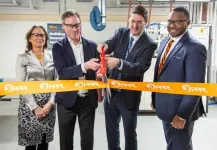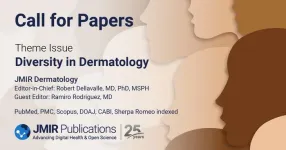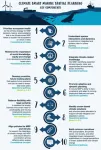(Press-News.org) Adults 65 and older, who were hospitalized for a variety of medical conditions, had highly satisfying conversations about whether they wanted CPR, regardless of whether doctors used the terms “allow a natural death” or “do not resuscitate” for indicating no CPR, according to a pilot study by Rutgers Health researchers.
The study, published in the Journal of the American Geriatrics Society, sought to determine the best language doctors could use when discussing a patient’s code status to reduce the barrier to having these conversations. It found that it takes less than five minutes on average for doctors to have discussions going over what CPR is, what a patient’s preference might be and making a decision that patients felt comfortable with regarding whether they want to be resuscitated, according to the study.
This finding counters a perceived obstacle physicians have in engaging in this discussion with patients. Physicians are sometimes reticent to discuss patients’ wish for resuscitation in the event their heart stopped beating or they stopped breathing because of the length of time it takes to deliver such complex communication in a time-sensitive, stressful environment and out of concern for confusing or scaring the patients.
“There is an active debate about whether all patients need to be asked their code status when they are admitted to the hospital,” said Karthik J. Kota, an assistant professor of medicine and geriatrics at Rutgers Robert Wood Johnson Medical School and chair of the ethics committee at Robert Wood Johnson University Hospital New Brunswick. “Some experts recommend limiting the discussion to those at higher risk for potentially needing CPR.”
In the study, doctors read standardized resuscitation procedures using the terms “do not resuscitate (DNR)” and “allow a natural death” to 108 patients 65 and older, and then had a conversation about what the patient would want the medical team to do if their heart stopped. After the conversations, which were timed, patients were surveyed about how well they understood and felt about the discussion.
“While the study did not clearly establish the doctors’ use of the term ‘allow a natural death’ as a better alternative to ‘do not resuscitate’ in regard to how informed patients felt about the decision they were making, it did provide evidence against two noted barriers to having the conversation by showing that the discussions were short – less than five minutes on average – and highly satisfactory to participants,” Kota said. “More than 90% were satisfied by the discussion. This tells us that barriers may not be as prevalent as previously feared and that physicians should ask all patients their code status regardless of phrasing used.”
The study, which found 83% wished to be resuscitated, is the first to report on the resuscitation preferences for general inpatients older than age 65. By comparison, a 1992 survey of an outpatient geriatric practice found that 41% preferred CPR. The Rutgers Health study also established that 17% of the older hospitalized adults had no code preference, which the researchers said will be used to inform larger studies.
END
In the resuscitation discussion, do words matter between doctors and patients?
Rutgers Health researchers seek to reduce barriers to physicians having code status conversations with older adults
2024-03-12
ELSE PRESS RELEASES FROM THIS DATE:
PPPL unveils new laboratory space to advance quantum information science
2024-03-12
Building on its more than 70 years pioneering the study of fusion energy, the U.S. Department of Energy’s (DOE) Princeton Plasma Physics Laboratory (PPPL) has added a new field to its research portfolio — quantum information science.
On March 11, PPPL opened its new Quantum Diamond Lab (QDL), a space devoted to studying and refining the processes involved in using plasma, the electrically charged fourth state of matter, to create high-quality diamond material for quantum information science applications. Scientists around the ...
Women with depression face higher cardiovascular risk than men
2024-03-12
People with depression face an increased risk of cardiovascular disease (CVD); however, more women experience CVD following a depression diagnosis than men, according to a new study published today in JACC: Asia. The study investigates the connection between depression and CVD, shedding light on potential mechanisms that contribute to its sex-based differences and underscoring the importance of tailoring CVD prevention and management strategies according to sex-specific factors.
Depression is the third leading cause of morbidity worldwide. Prior research shows that it is associated with a heightened risk of cardiovascular events, ...
SLAS announces $100,000 graduate education fellowship grant awarded to Lan Mi of the University of Massachusetts Amherst
2024-03-12
Oak Brook, IL (March 12, 2024) – The Society for Laboratory Automation and Screening (SLAS) is pleased to announce Lan Mi, Ph.D. candidate in the Department of Chemistry from the University of Massachusetts Amherst (Amherst, Massachusetts, USA), as the 2024 SLAS Graduate Education Fellowship Grant recipient.
The SLAS grant will support Mi's research regarding the synthesis and applications of fluorogenic RNA aptamers for extensive in vitro and in vivo investigations. It will also support her work in developing and assessing fluorogenic RNA-based sensors, employing high-throughput ...
A ‘smart’ examination to improve livestock management efficiency
2024-03-12
A Texas A&M AgriLife animal nutritionist believes precision livestock management — utilizing an extra set of eyes and ears and a little artificial intelligence — can go a long way toward making today’s livestock operations more efficient.
Computer monitors and cameras, along with artificial intelligence, are part of a precision livestock management system being researched by Luis Tedeschi, Ph.D., in the Texas A&M Department of Animal Science. (Michael Miller/Texas A&M AgriLife)
Luis Tedeschi, Ph.D., Texas A&M AgriLife Research Fellow and Chancellor EDGES Fellow in the Texas A&M ...
JMIR Dermatology invites submissions on Diversity in Dermatology
2024-03-12
(Toronto, March 12, 2024) JMIR Publications is pleased to announce a new theme issue titled “Diversity in Dermatology” in JMIR Dermatology. The premier, peer-reviewed journal is indexed in Sherpa Romeo, Scopus, DOAJ, CABI, and PubMed Central/PubMed and is the official journal of the International Society of Digital Health in Dermatology (ISDHD).
Diversity plays a significant role in dermatology, influencing various aspects of health care delivery in community health. Current research consistently highlights the advantages of diversity in the health care sector in patient outcomes and dermatological research. JMIR Dermatology places a special emphasis on exchanging ...
A sprayable gel could make minimally invasive surgeries simpler and safer
2024-03-12
CAMBRIDGE, MA -- More than 20 million Americans undergo colonoscopy screenings every year, and in many of those cases, doctors end up removing polyps that are 2 cm or larger and require additional care. This procedure has greatly reduced the overall incidence of colon cancer, but not without complications, as patients may experience gastrointestinal bleeding both during and after the procedure.
In hopes of preventing those complications from occurring, researchers at MIT have developed a new gel, GastroShield, that can be sprayed onto the surgical sites through an endoscope. This gel forms a tough but flexible protective layer that ...
Scientists propose ten key components to foster climate-smart marine spatial planning globally
2024-03-12
New study identifies ten key components that will promote the development and implementation of sustainable, equitable, climate-smart ocean planning initiatives around the globe.
In a paper published March 12 in npj Ocean Sustainability, the researchers outlined guidelines to support marine managers and planners on how to develop climate-smart ocean plans and put them into action. Led by Catarina Frazão Santos, researcher and professor at the Faculty of Sciences of the University of Lisbon (Ciências ULisboa) and honorary research associate at the University of Oxford, the team ...
UC Irvine study: vehicle brakes produce charged particles that may harm public health
2024-03-12
Irvine, Calif., March 12, 2024 — Scientists know relatively little about particles released into the air when a vehicle driver brakes, though evidence suggests those particles may be more harmful to health than particles exiting the tailpipe.
In a new study in Proceedings of the National Academy of Sciences, University of California, Irvine researchers show how most of these particles emitted during light braking carry an electric charge – something that could potentially be ...
Aston University to train the UK’s next generation of decarbonization experts
2024-03-12
Consortium led by the University is to receive almost £11 million to open doctoral training centre
Will focus on use of biomass to replace fossil fuels and removal of CO2
“…part of the UK’s biggest-ever investment in engineering and physical sciences doctoral skills”.
Aston University is to train the next generation of scientists tasked to remove greenhouse gases from the environment.
A consortium led by the University is to receive almost £11 million to open a doctoral ...
Gene flow in giraffes and what it means for their conservation
2024-03-12
Giraffes are a beautiful and powerful example of what adaptive evolution can achieve. However, in recent years they have attained notoriety for a completely different reason: it has been suggested that instead of one giraffe species, there might be no fewer than four different species. Such dramatic taxonomic reappraisals in highly conspicuous and well-known “flagship” taxa are very unusual. The suggestion caused some uproar in the scientific community and received a lot of media attention. Much is at stake, because the way that most nature conservation works is focused on species, meaning that each species must receive its own dedicated conservation action plan and must ...
LAST 30 PRESS RELEASES:
SfN announces Early Career Policy Ambassadors Class of 2026
Spiritual practices strongly associated with reduced risk for hazardous alcohol and drug use
Novel vaccine protects against C. diff disease and recurrence
An “electrical” circadian clock balances growth between shoots and roots
Largest study of rare skin cancer in Mexican patients shows its more complex than previously thought
Colonists dredged away Sydney’s natural oyster reefs. Now science knows how best to restore them.
Joint and independent associations of gestational diabetes and depression with childhood obesity
Spirituality and harmful or hazardous alcohol and other drug use
New plastic material could solve energy storage challenge, researchers report
Mapping protein production in brain cells yields new insights for brain disease
Exposing a hidden anchor for HIV replication
Can Europe be climate-neutral by 2050? New monitor tracks the pace of the energy transition
Major heart attack study reveals ‘survival paradox’: Frail men at higher risk of death than women despite better treatment
Medicare patients get different stroke care depending on plan, analysis reveals
Polyploidy-induced senescence may drive aging, tissue repair, and cancer risk
Study shows that treating patients with lifestyle medicine may help reduce clinician burnout
Experimental and numerical framework for acoustic streaming prediction in mid-air phased arrays
Ancestral motif enables broad DNA binding by NIN, a master regulator of rhizobial symbiosis
Macrophage immune cells need constant reminders to retain memories of prior infections
Ultra-endurance running may accelerate aging and breakdown of red blood cells
Ancient mind-body practice proven to lower blood pressure in clinical trial
SwRI to create advanced Product Lifecycle Management system for the Air Force
Natural selection operates on multiple levels, comprehensive review of scientific studies shows
Developing a national research program on liquid metals for fusion
AI-powered ECG could help guide lifelong heart monitoring for patients with repaired tetralogy of fallot
Global shark bites return to average in 2025, with a smaller proportion in the United States
Millions are unaware of heart risks that don’t start in the heart
What freezing plants in blocks of ice can tell us about the future of Svalbard’s plant communities
A new vascularized tissueoid-on-a-chip model for liver regeneration and transplant rejection
Augmented reality menus may help restaurants attract more customers, improve brand perceptions
[Press-News.org] In the resuscitation discussion, do words matter between doctors and patients?Rutgers Health researchers seek to reduce barriers to physicians having code status conversations with older adults






